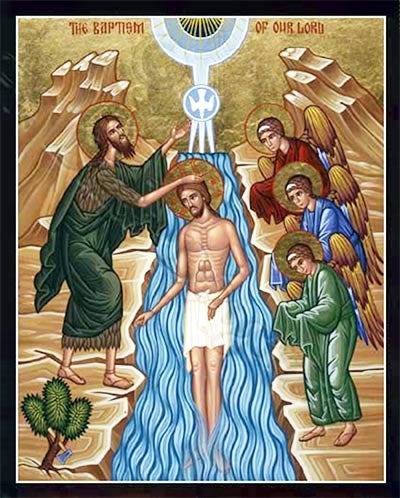Jesus’ Baptism & Ours

If we would not be too proud to admit it, many of us American Protestants are scared of water. Whenever people start talking about what happens in baptism instead of what doesn’t happen in baptism, many of us start twisting in our seats. Images of superstitious priestcraft and mechanical guarantees of salvation start to swirl through our heads, and we have violent reactions like any good Protestant.
Some of us have seen people presume upon God because they have been baptized. That kind of abuse of baptism has caused us to go to the opposite extreme and reject any effect of baptism at all. Besides that, we know that God wouldn’t use water on our bodies to do anything substantive in regards to our salvation. That all happens directly by the Holy Spirit without any sort of means.
Fears about presumption are real and many times well-grounded. People abuse good things all the time. But abuse of a good thing doesn’t make a good thing a bad thing. Abuse only reveals the wickedness of those who abuse good things. So, we don’t need to throw out the baby with the baptismal waters. And to say that God surely wouldn’t use anything material to effect something “spiritual” would be like saying that God couldn’t use a rod to split a sea, use a man and woman to create a being that will live forever, or use preaching of a sinful man to create saving faith.
There is no need to be afraid of water. Jesus went through the water first so that we could follow him and learn what God says about us when he applies the waters of baptism to us. We are, after all, baptized into Christ (Rom 6.1-4), and, therefore, his baptism is our baptism.
This Sunday is “The Baptism of Jesus” on the Church Calendar. It is a yearly reminder of our participation in Christ and his baptism. So, what do we learn about our baptism from Jesus’ baptism as recorded in the Gospels?
1. Baptism is a Trinitarian event.
At Jesus’ baptism the whole Trinitarian family was participating. The Father was speaking. The Spirit was descending. The Son was receiving. Being baptized in union with Christ means that we join the family. Our baptism is into the name of the Father, Son, and Spirit (Matt 28.19) means that we now share the family name.
2. Baptism gives access to the heaven.
When Jesus was baptized the heavens were opened. Access to the throne of heaven was granted to Jesus, and, in him, we have access to the heavenly throne room as well (Heb 4.16). Our baptism calls us into a life of prayer with the people of God.
3. Baptism means that we have received the gift of the Spirit.
The Spirit of God descended upon Jesus’ body at the River Jordan. This baptism was given to his body, the church, at Pentecost. Anyone entering the body of Christ, the church, receives the gift of the Spirit, uniting us in a bond of love with the Father, the Son, and with the rest of the members of the body of Christ.
4. Baptism is a declaration of sonship.
At baptism God declares Jesus to be his beloved son in whom he is well-pleased. In Christ Jesus we are declared sons of God in whom the Father delights. The Father doesn’t merely tolerate you, he delights in you. You are his beloved child.
5. Baptism is the declaration of God about us, not our declaration about God.
God is speaking in baptism, and we listen. We passively receive what God says. The word of God about us determines our identity. It is not what we think about ourselves, but what God says about us that matters. Ours is to receive by faith what God said.
6. Baptism is an act of deliverance.
The imagery of Jesus’ baptism being in the River Jordan as well as the Spirit resting on him in the form of a dove point to two distinct, yet related, events. The Spirit resting upon Jesus in the form of a dove looks back to the time God delivered Noah, his family, and the animals through the flood waters into a new creation (which was a baptism according to Peter (1Pet 3.20-21)). Passing through the Jordan looks back to the time when Israel entered the Promised Land. Our baptism in Christ means that we have entered a new creation; namely, the church. You and I are no longer of the world that stands in opposition to God.
7. Baptism is a calling to mission.
To be the Son of God was not a static position of privilege for Jesus. Being the Son meant that he had a mission as the last Adam to take dominion of the world through his death, resurrection, ascension, and continuing reign. Being baptized into Christ means that we share that mission with him.
So, don’t be scared of the water. Receive God’s watery word by faith.
The post Jesus’ Baptism & Ours appeared first on Kuyperian Commentary.

